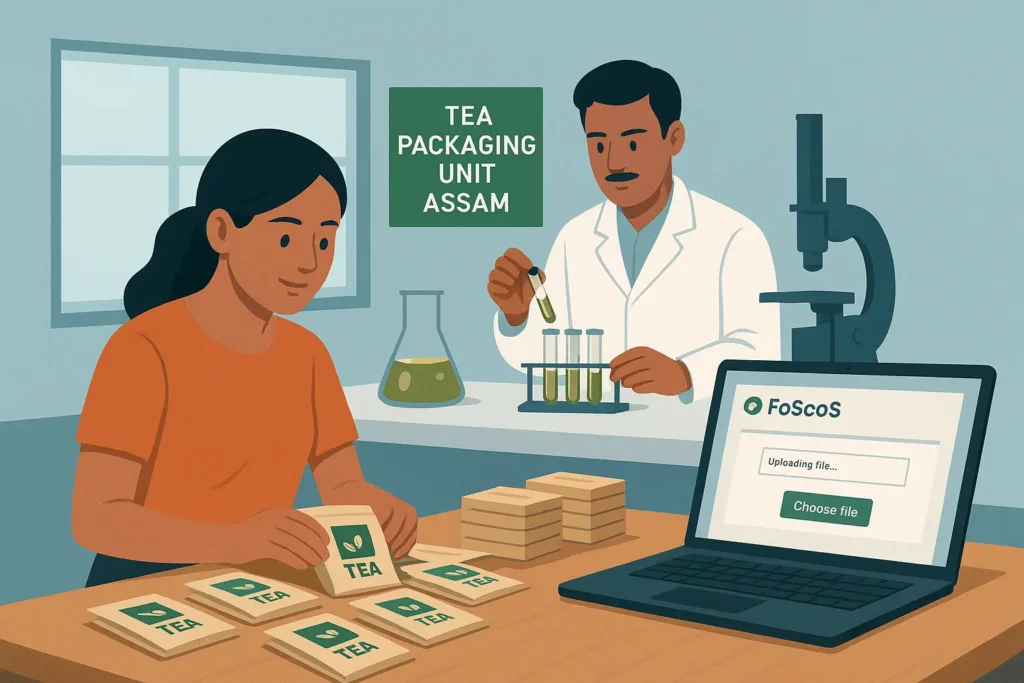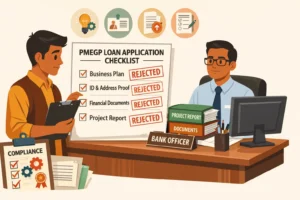
What is mandatory FSSAI Food Product Testing?
The Food Safety and Standards Authority of India (FSSAI) requires food businesses to conduct lab testing every six months. This applies to food manufacturers, repackers, relabelers, and importers.
Testing must be done in NABL-accredited or FSSAI-notified labs, and reports uploaded to the FoSCoS portal on time.
You may also like to read: ISO 22000 vs HACCP: Complete Guide to ISO Certification for Food Businesses
My Experience in Assam as an MSME Tea Business for FSSAI Food Product Testing
Running a small tea packaging unit in Assam, I have personally gone through the FSSAI food testing process.
- Every six months, I send my tea packets to a government-accredited lab.
- The process is simple and transparent.
- I upload the results directly to the FoSCoS portal, which is user-friendly.
- The testing fee I paid last time was ₹1,000.
While uploading is easy, one must be very vigilant: if you miss the deadline, there can be heavy penalties.
👉 My request to the government: Please consider reducing the testing fee, especially for MSMEs. Paying twice a year adds up and becomes a real burden for small businesses.
Who Must Comply with FSSAI Food Product Testing six month mandatory report?
- Food manufacturers (packaged/processed products)
- Repackers & relabelers
- Importers
- Dairy, meat, poultry processors
- Nutraceutical & supplement manufacturers
Street vendors and very small food stalls are not directly included.
Step-by-Step Process of FSSAI Food Product Testing
- Collect Product Samples
Your own production batch (final packed goods) must be sampled. - Choose a Lab
- In-house NABL-accredited lab, if available
- Government food testing labs
- Private FSSAI-notified labs
- Testing Parameters
Tests may include:- Basic parameters (moisture, acidity, etc.)
- Microbiological tests (E. coli, Salmonella, yeast/moulds)
- Chemical contaminants (pesticides, preservatives, adulterants)
- Heavy metals (lead, arsenic, mercury, cadmium)
- Receive Lab Report
The report confirms whether the product meets FSSAI standards. - Upload to FoSCoS
Log in to the portal → Enter details → Upload PDF → Submit before the deadline.
FSSAI Food Testing Fees in India
Are the Fees the Same Across India?
No. Fees vary depending on:
- State government vs private labs
- Type of tests (basic, heavy metals, pesticides, microbiological)
- Number of product samples
Examples of Fees
- Assam Government Lab: ₹1,000 for tea packet testing (my experience)
- Kerala State Lab: ₹2,000 – ₹3,000 for basic food parameters
- Private NABL labs: ₹5,000 – ₹19,500+ depending on complexity
FSSAI Testing for MSMEs vs Large Businesses
Currently, the rule applies equally to MSMEs, small businesses, and large companies. There is no reduced fee for MSMEs.
This is where the government could step in:
- Offer discounted rates for MSMEs
- Provide cluster-based testing support for small businesses
- Reduce duplication of costs when the same product is tested repeatedly
Deadlines You Must Remember
- April – September samples → Upload by October 31
- October – March samples → Upload by April 30
⏳ Missing the deadline = heavy penalties, so MSMEs must be extra careful.
Why FSSAI Testing Matters
- Builds consumer trust
- Improves brand credibility
- Helps with export compliance
- Avoids license issues & fines
FAQs
Q1. Is food testing mandatory for tea packaging businesses in Assam?
✅ Yes. Manufacturers, packagers, and relabelers must comply.
Q2. How much does FSSAI testing cost in Assam?
💰 Around ₹1,000 per product (government lab fees).
Q3. Do MSMEs get a discount on testing fees?
❌ No, the current rule applies equally to all businesses.
Q4. How easy is the FoSCoS upload process?
Very easy, but deadlines must be strictly followed to avoid penalties.
Q5. Can the government reduce costs for MSMEs?
It’s highly recommended. MSMEs request lower fees since paying twice yearly is costly.
About the Author
Tabrez writes practical guides for MSME owners, entrepreneurs, and small business leaders across India. BusinessZindagi simplifies finance and growth topics for everyday business owners.




